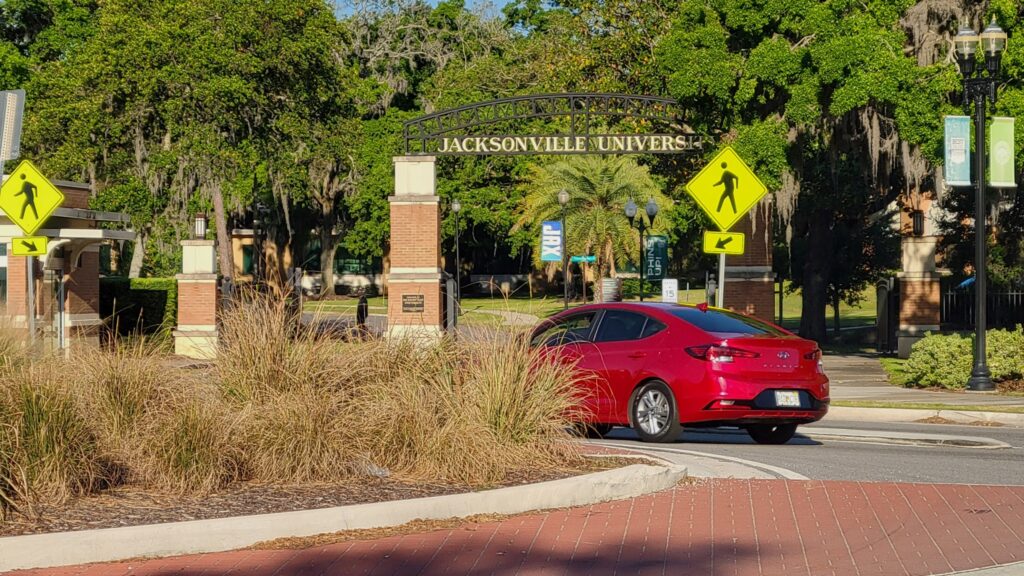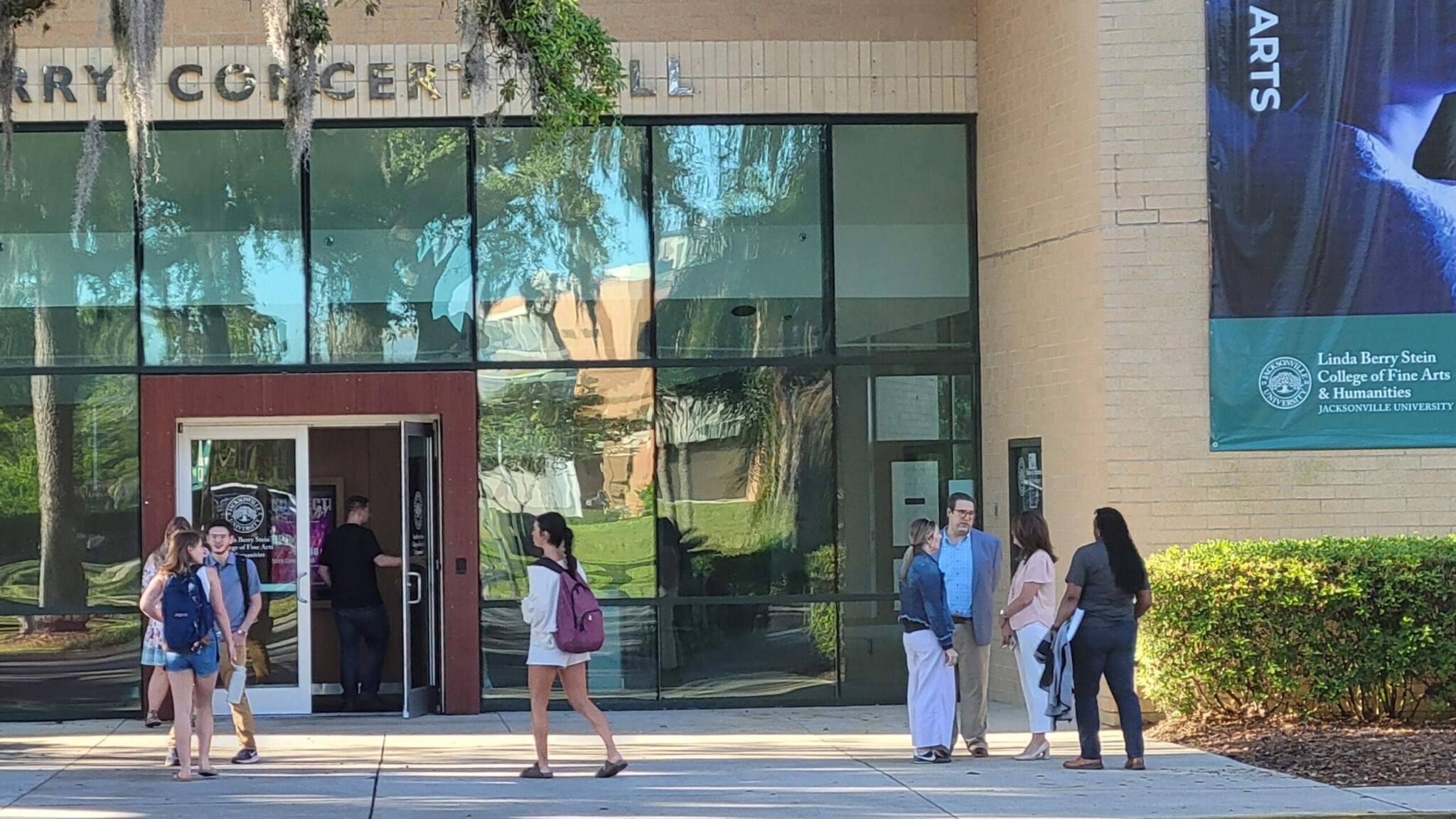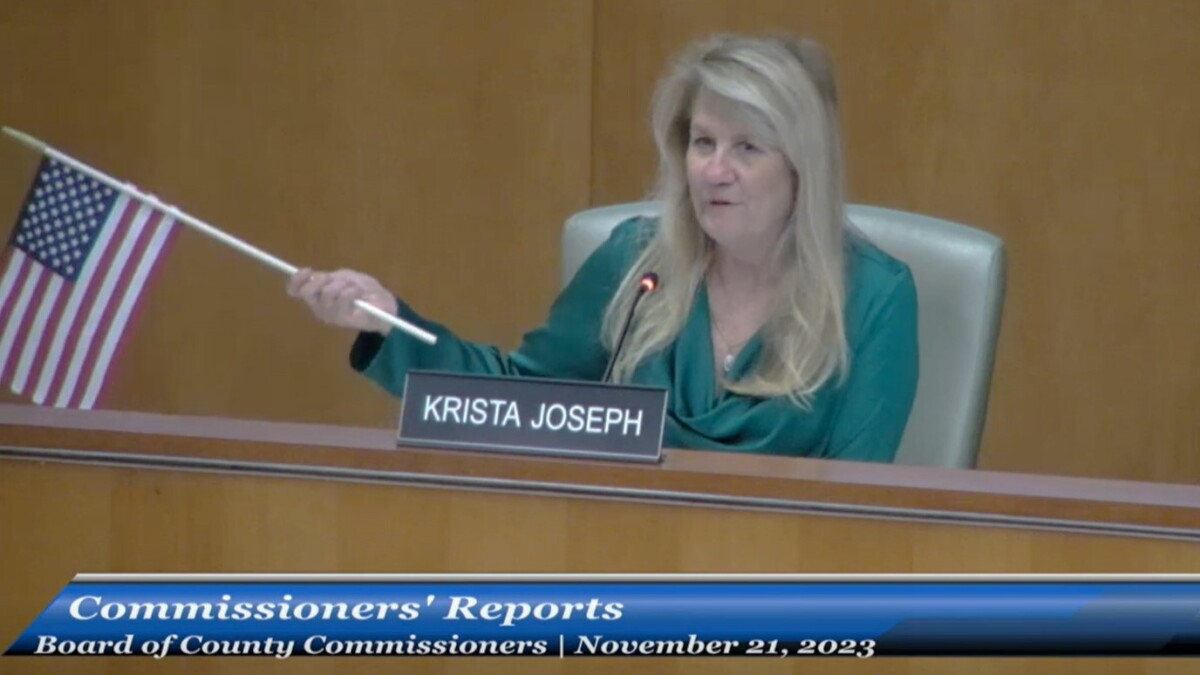Jacksonville University will cut music and theater programs from its curriculum in a reorganization that will affect about 100 students and cost 40 faculty members their jobs.
The cuts, an effort to save $10 million, are intended to align the university’s courses with the needs of today’s working world. They were announced to the affected students Tuesday morning. Some students appeared angry or crying as they left the meeting.
Teachers had their own meeting with the administration, where they learned they will be laid off as the students they teach graduate. They included music history and percussion professor Tony Steve, one of 250 faculty at the university.
“It’s a sad day to be a Dolphin — I’m an alum. It’s a very sad day to be in the academy, to see this happen, and to wonder how this could have been avoided,” Steve said. “What do I do now? I keep playing. … I sub with the symphony and I have some other gigs and do some private teaching, and I’ll possibly retool.”
JU adjustments
The program cuts are part of a drive to meet market needs and create long-term financial sustainability at the private, 4,200-student school, JU President Tim Cost said.
The undergraduate majors and minors in highest demand will remain, including nursing, health care science, business administration, psychology, computer science, cybersecurity, marine science, aviation, finance, dance and visual and media arts.
But what JU calls “consistently undersubscribed and specialized fields of study” — 22 art, music and other programs — will be sunsetted after current students complete them. They will not be offered as majors to incoming students next fall.
“We will continue to emphasize the 37 most highly subscribed-to undergraduate degrees here, not 60 any longer, and we will focus on the 15 graduate degrees most highly valued by the students and community, not 25 any more,” Cost told Jacksonville Today.
“It’s a matter of focus, prioritization and execution. Along the way we are going to reduce the costs at the university by about 10%, and we will separate about 6% of the employees who work here, and we will impact about 100 students.”

Jacksonville University was founded in 1934. Its 235-acre riverfront campus in Arlington now offers programs in nursing, business, law, marine science, engineering, finance, aviation, psychology, communication sciences and disorders and the fine arts.
The university on Tuesday announced its Future Focused initiative to create long-term financial sustainability. An email sent to students and staff said the decisions are the result of an intensive process over the past six months to understand demand for various programs and the future opportunities in those fields.
The remaining courses represent the majors of 96% of current Jacksonville University students, Cost said. Among them:
- Jacksonville’s first four-year medical school, which plans its first class in 2026 in a partnership with Lake Erie College of Osteopathic Medicine and Ascension St. Vincent’s partnering in an accelerated bachelor’s degree program in nursing.
- Health, exercise and nursing curriculums of Brooks Rehabilitation College. So are the cybersecurity, engineering, sport business and communications programs at the Davis College of Business, as well as its accounting, aviation, business and computer science courses.
- Twenty undergraduate programs at the Linda Berry Stein College of Arts and Science, including biology, chemistry, marine science, English, economics and history. The college’s dance, animation, film, game and visual design, ceramics, illustration and other courses also will be offered.
The 15 graduate programs include high-demand fields such as clinical mental health counseling, speech-language pathology, public policy, business, marine science and dance. JU’s new law school, now in its permanent home on West Forsyth Street in Downtown Jacksonville, will continue all programs as it graduates its first class in May.
Behind the cuts
The changes boiled down to whether the university wanted to keep offering students legacy programs of old or programs “that get them ready for the 2030s,” Cost said.
“We had to look at how the students were looking at things like glassblowing, world arts or languages. They are taking much less of those historically, and we had to look at that,” Cost said. “Music, theater and the humanities are what we are talking a good deal about today, and there’s an increased emphasis on health care, business and technology, which I think reflects a lot of what is going on in Jacksonville.”
Cost would not say specifically whether the changes are the result of debt that had to be addressed in the not-for-profit university.
“If you are asking me whether the music program made money, no,” Cost said. “But this was not solely about if we could target any individual program. We looked at what the students’ behavior had been over a long period of time and when people are coming here, and you having zero, one, two or three majors in a field, we had to take a look at it.”
About 20 of the 100 students will be “affected more than others” by the consolidation of programs, Cost said. For them, a private donor will pay their tuition until they get their bachelor’s degree.
“They may have to consider in their same field but a different name to their major,” Cost said. “Every one of those 20 is being offered a full tuition scholarship all to way to graduation, which they don’t have today. … Many of them are freshmen.”
Campus officials did not allow student interviews immediately after administrators net with them at 8:45 a.m. Steve, the music history professor, said they have let their feelings be known to him since word slipped out late Monday.
“Students have been texting me since yesterday, and I’ve been deflecting,” Steve said. “I don’t know what happens to them. I wish I had an idea what would happen.”







